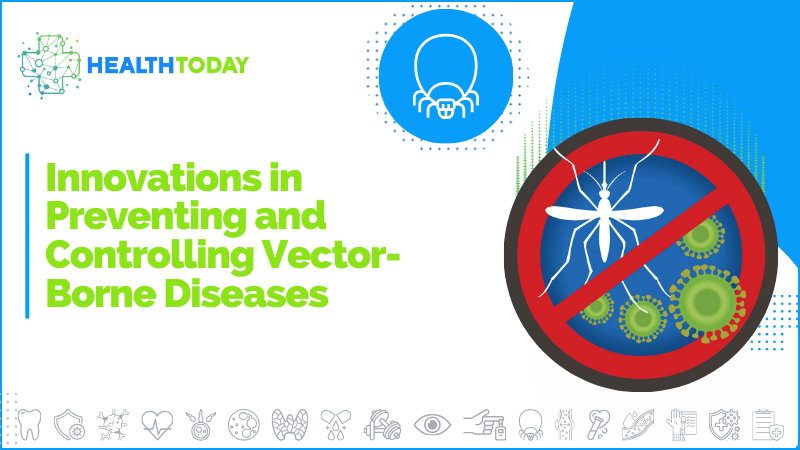
In the face of escalating vector-borne diseases, innovative strategies are critical for effective control and prevention. Health Today highlights groundbreaking advancements such as gene editing in mosquitoes using CRISPR-Cas9 technology, the development of vaccines for diseases like dengue and Zika, and the introduction of novel diagnostic tools. These technologies promise to transform the fight against diseases by targeting mosquitoes, enhancing immunization efforts, and improving disease detection, especially in remote areas. Embracing these innovations could significantly reduce the incidence and impact of vector-borne diseases worldwide, marking a new era in public health management. With continued research and investment, these advancements offer hope for a future where such diseases are manageable, underscoring the importance of innovation in safeguarding global health.
In the ongoing battle against vector-borne diseases, the stakes have never been higher. With climate change expanding the habitats of disease-carrying vectors and global mobility at an all-time high, traditional methods of control and prevention are being outpaced. From dengue fever to Zika, the global community faces significant challenges in keeping these diseases at bay. However, hope springs from the realm of scientific innovation, where cutting-edge research and technology are forging new paths in our fight against these pervasive threats. At Health Today, we're committed to exploring and highlighting these advancements, showcasing how they promise to revolutionize our approach to safeguarding public health.
One of the most groundbreaking advancements in the fight against vector-borne diseases is the development of gene editing techniques, particularly CRISPR-Cas9 technology. This method allows scientists to make precise alterations to the DNA of mosquitoes, the primary vectors for diseases like malaria, Zika, and dengue fever. By editing the genes of mosquitoes to reduce their lifespan or render them infertile, researchers aim to drastically reduce mosquito populations or create populations that cannot transmit diseases. Trials in various parts of the world have shown promising results, with gene-edited mosquitoes potentially becoming a key weapon in our arsenal against these diseases. This approach not only offers a more sustainable alternative to chemical insecticides but also targets the problem at its source, reducing the reliance on broad-spectrum pesticides that can harm beneficial insects and the environment.
Vaccine development represents another critical front in the battle against vector-borne diseases. While vaccines for some diseases, like yellow fever, have been around for decades, others, such as dengue and Zika, have eluded comprehensive vaccination solutions until recently. The development of a dengue vaccine, despite its complex requirements due to the virus's four different serotypes, marks a significant milestone. Continued research aims to improve the efficacy and safety of these vaccines, offering hope for widespread immunization in endemic regions. Moreover, the ongoing research into vaccines for Zika and other emerging diseases underlines the importance of preemptive research and development efforts. By investing in vaccine research, we can potentially halt outbreaks before they start, saving countless lives and reducing the economic impact of these diseases.
Rapid and accurate diagnosis is pivotal in controlling the spread of vector-borne diseases. Recent advancements in diagnostic tools are set to transform our ability to detect and respond to disease outbreaks. Portable, rapid diagnostic kits, which can detect pathogens in human blood or saliva samples within minutes, are a game-changer for remote or resource-poor areas. These tools not only facilitate early detection and treatment but also aid in mapping disease outbreaks in real time, enabling a more targeted and effective response. Furthermore, the integration of artificial intelligence and machine learning in diagnostic processes promises to enhance the precision and speed of disease detection, paving the way for a more proactive approach to outbreak management.
Adopting dentures doesn't mean parting ways with your beloved dishes. With a bit of adaptation and the willingness to try new eating habits, you can continue to relish a vast array of delightful meals. At Health Today Dentures, we are dedicated to guiding you through each step of your denture journey, ensuring you dine with confidence and ease. Starting with softer foods, adjusting bite sizes and temperatures, and learning new ways to chew can make your dentures feel more like a natural part of your life rather than a limitation to your diet. With patience and practice, you'll discover that enjoying your favourite foods is still very much within reach, and we’re here to support you every step of the way.
Written on behalf of Health Today.
Vector-borne diseases are infections transmitted by the bite of infected arthropod species, such as mosquitoes, ticks, and fleas. Examples include dengue fever, Zika virus, Lyme disease, and malaria.
Gene editing, particularly using CRISPR-Cas9 technology, involves altering the DNA of mosquitoes to either reduce their population or make them incapable of transmitting diseases. This can include gene drives that spread sterility or resistance to pathogens throughout mosquito populations, significantly lowering disease transmission rates.
Recent advancements include the development of vaccines for dengue and Zika viruses.
These vaccines work by stimulating the body's immune response to these viruses, reducing the risk of infection and the severity of disease in vaccinated individuals.
Innovation is crucial for developing more effective ways to prevent, detect, and treat vector-borne diseases, especially as climate change and globalization increase the risk of these diseases spreading. Advanced technologies and research can lead to breakthroughs that significantly reduce the global burden of these diseases.
Individuals can protect themselves by using insect repellent, wearing long-sleeved shirts and pants, ensuring homes are fitted with screens to keep vectors out, eliminating standing water where mosquitoes breed and staying informed about vaccination options and disease outbreaks in their area.